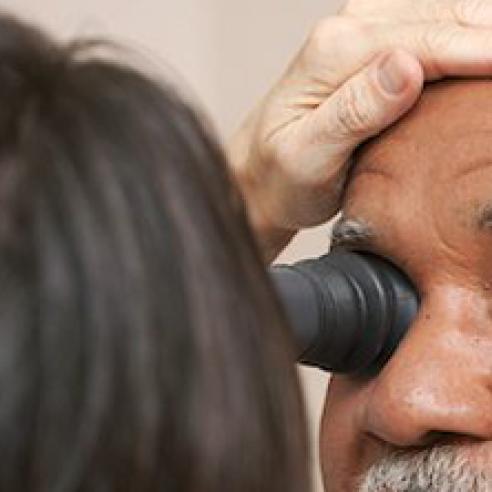RPB researchers are working to improve the management and early detection of glaucoma.
Glaucoma
Click one of the video selections to view.
Glaucoma refers to a group of diseases -- open-angle glaucoma, angle-closure glaucoma, low-tension or normal-tension glaucoma, congenital glaucoma, and secondary glaucoma -- where cells and fibers of the optic nerve are damaged, affecting the transmission of signals from the eye to the brain. It is usually progressive. At first there are no detectable symptoms but, eventually, vision narrows. Glaucoma can lead to blindness, but seldom does when diagnosed and treated early.
View a video presentation on glaucoma from the National Eye Institute.
The eye is filled with nutrient-rich fluid, called aqueous humor. Normal intraocular pressure (IOP) is maintained through a balance between the fluid produced inside the eye and the amount drained. In glaucoma, excess fluid typically builds up because of a blockage of the drainage channels or filtering tissue called the trabecular meshwork. Researchers are developing treatments to help maintain the capacity of these drainage tissues.
Until recently, physicians and scientists believed that damage from glaucoma was solely due to increased intraocular pressure (IOP). Medications and conventional or laser surgeries are typically prescribed to reduce the fluid build-up. Now, though, we know that high IOP does not always cause glaucoma and that glaucoma can even occur when IOP is normal. Research supported by RPB shows that thickness of a patient's cornea may also be related to glaucoma onset.
Glaucoma poses an enormous public health problem. The government estimates that 2.2 million Americans have been diagnosed with glaucoma. Experts believe that nearly 2 million more may have the disease and not know it.
Related News: Glaucoma

Research Finds Risk of Glaucoma Blindness Drops by Half
Compared to earlier generations, today's generation has a 50% reduced probability of losing sight to glaucoma 20 years after a diagnosis, according to research supported by RPB.Read the story.Read the...

RPB Study Urges Glaucoma Screening for Older African Americans
Routine screening of older African Americans for glaucoma -- a high-risk group -- would significantly reduce the incidence of blindness at relatively low cost, RPB researchers report in a recently published...

“Smart” Contacts May Someday Test for and Treat Glaucoma
Scientists have designed and tested a pressure-sensing contact lens that will, in the future, allow glaucoma patients to monitor their eye pressure at home, providing more detailed and continuous information in...

Thyroid Problems May Increase Glaucoma Risk
According to an RPB-supported study, people who have had a thyroid condition at some point in their life are at an increased risk of developing glaucoma. The link between glaucoma and thyroid disorders may be due to...

RPB Supports World Glaucoma Day 2009
As a major contributor to the comprehensive effort to treat, prevent and cure glaucoma, Research to Prevent Blindness is joining with institutions and organizations worldwide to...
Subscribe
Get our email updates filled with the latest news from our researchers about preventing vision loss, treating eye disease and even restoring sight. Unsubscribe at any time. Under our privacy policy, we'll never share your contact information with a third party.
| General Info | Research Scientists & Grantees | Eye Care Specialists | Donors & Partners |



